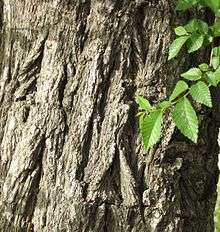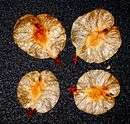Ulmus canescens
| Ulmus canescens | |
|---|---|
 | |
| Bark and young leaves, Antal Ben Shaddad, Jerusalem | |
| Scientific classification (disputed) | |
| Kingdom: | Plantae |
| (unranked): | Angiosperms |
| (unranked): | Eudicots |
| (unranked): | Rosids |
| Order: | Rosales |
| Family: | Ulmaceae |
| Genus: | Ulmus |
| Species: | U. canescens |
| Binomial name | |
| Ulmus canescens Melville | |
| Synonyms | |
| |
Ulmus canescens Melville is a small deciduous tree occasionally known by the common names Grey Elm, Grey-leafed Elm, and Hoary Elm. Its natural range extends through the lands of the central and eastern Mediterranean, from southern Italy,[1] the islands of Sicily,[2] 'Canescens' in Malta,[3] Crete,[4] Rhodes[5] and Cyprus, to Turkey,[6] and as far south as Israel, where it is now considered rare and endangered.[7] The tree is typically found amidst the comparatively humid coastal woodlands and scrublands.
The taxonomy of the tree remains a matter of contention, some authorities treating it as a subspecies of Ulmus minor.[8][9]
Description

The tree is comparatively small, < 20 m high; the slender trunk, its bark coarsely fissured, supporting a rounded crown. The leaves are elliptic to ovate, bluntly toothed, and densely downy on the underside when mature, imbuing them with a distinctive greyish hue.[10] The young shoots also have a whitish-grey down.[11] The tree flowers in February and March, the round samarae, < 15 mm diameter, deeply notched at the outer end, ripen in April.[12][13]
Pests and diseases
U. canescens is highly susceptible to Dutch elm disease.
Cultivation
U. canescens is occasionally planted as a street tree in Israel. There are no known cultivars of this taxon, nor is it known to be in commerce.
Notable trees
Mature trees occur in Jerusalem near the Damascus Gate along the Prophets Road and Antal Ben Shaddad street. In Nazareth, a line of mature trees is found along the road leading to the Basilica.
Accessions
- North America
- Morton Arboretum. Acc. no. 395-76
- Europe
- Grange Farm Arboretum, Sutton St James, Spalding, Lincs., UK. Acc. no. 826.
- Royal Botanic Garden Edinburgh, UK. Acc. no. 20090690. From seed wild collected in Israel.
- Sir Harold Hillier Gardens, UK. Acc. no. 2009.0334. From seed wild collected in Israel.
References
- ↑ Richens, R. H., Elm (Cambridge 1983), p.18
- ↑ Scialabba, A., M. R. Melati, and F. M. Raimondo. "Taxonomic studies on the Sicilian elms: leaf structure of their species and hybrids." Bocconea 5.2 (1997): 493-504.
- ↑ Plant: Ulmus canescens (Hoary Elm): Wild Plants of Malta & Gozo - Plant: Ulmus canescens (Hoary Elm), accessdate: October 27, 2016
- ↑ 'Canescens' in Crete, (1) in the Apokoronas region: George Sfikas, Trees and shrubs of Greece (Athens, 2nd ed. 2001) p.140; (2) in the Aghia Irene gorge in the Temenos region: Natural Europe Project, University of Crete, europeana.eu http://www.europeana.eu/portal/record/2023901/content_7af226a0_c461_4c99_8ce8_9de4e41fa3ac.html Small leaved Elm, Ulmus minor subsp. canescens | Avramakis, M.
- ↑ Flore of Rhodes: Ulmus canescens - Flore of Rhodes, accessdate: October 27, 2016
- ↑ 'Canescens' in Turkey, "Herbarium specimen - E00405654". Herbarium Catalogue. Royal Botanic Garden Edinburgh.
- ↑ Flora of Israel Online: Ulmus minor Mill. | Flora of Israel Online, accessdate: October 27, 2016
- ↑ Richens, R. H. (1983). Elm. Cambridge University Press, England.
- ↑ Melville, R. (1978). On the discrimination of species in hybrid swarms with special reference to Ulmus and the nomenclature of U. minor (Mill.) and U. carpinifolia (Gled.). Taxon 27: 345-351
- ↑ Herbarium leaf-specimen, with rule: "Herbarium specimen - E00405654". Herbarium Catalogue. Royal Botanic Garden Edinburgh.
- ↑ Diagnostic photographs of 'Canescens' in Malta: Hoary elm, maltawildplants.com
- ↑ Bean, W. J. (1980). Trees and shrubs hardy in Great Britain. 8th edition. Murray, UK.
- ↑ Melville, R. (1957). "Ulmus canescens: an eastern Mediterranean elm." Kew Bulletin: 499-502, 1957
External links
- Euforgen: elms.
- Melville, R. (1 January 1957). "Ulmus canescens: An Eastern Mediterranean Elm". Kew Bulletin. 12 (3): 499–502. doi:10.2307/4113729. JSTOR 4113729.